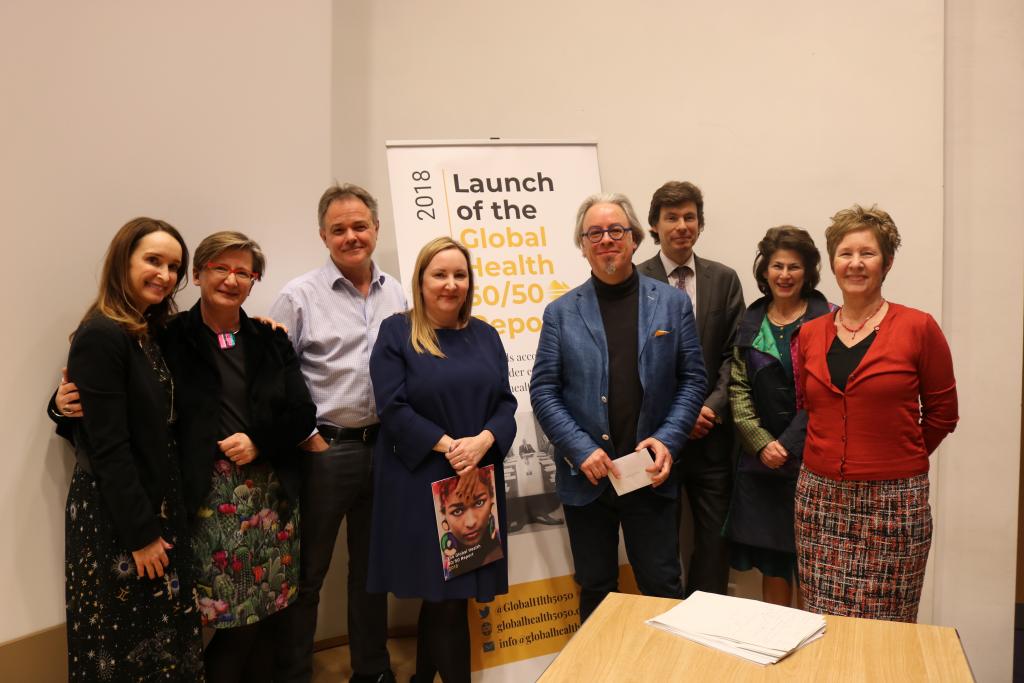In March 2018, Global Health 50/50, an independent initiative housed by the University College London Centre for Gender and Global Health, launched its inaugural report. The report, which is the first of its kind, provides a unique assessment of seven domains related to gender equality. These include: public statement of commitment to gender equality; gender defined in institutional policies and consistent with global norms; programmatic policies in place to guide gender-responsive action; sex-disaggregated data collected and reported; workplace policies and practices with specific measures to promote gender equality in place; gender parity in governance bodies and senior management; and gender of the head of the organisation and of the head of its governing body.
Of the 140 organisations involved in the study, which included United Nations entities, bilateral and multilateral development institutions, philanthropic organisations and funders, civil society and nongovernmental organisations, public-private partnerships and the private sector, only one out of three state a commitment to gender equality to benefit the health of all people. Only 40% of organisations mention gender in their programme and strategy documents and two-thirds of organisations do not disaggregate their programme data by sex. Decision-making power remains in the hands of men, with 69% of organisations headed by men and only 20% having achieved gender parity on their boards.
While the evidence provided by Global Health 50/50 is sobering, it provides a strong basis for action, with the Deputy-Secretary-General Amina Mohammed calling for similar analysis to be done in all sectors. The evidence put forward in the report provides a unique opportunity to act, urging for the recommendations put forward in the report to be enacted, including:
- Global health is intrinsically driven by gender, affecting exposure to health risks, health seeking behaviours, access to quality healthcare and outcomes of health and wellbeing. As global health leaders come together to take action for better global health for all, gender must be a consideration across the board.
- Leaders in organisations need to exercise commitment to gender equality and incentivise policies and practices that respond to evidence on the impact of gender on the health, well-being and careers of women and men;
- Organisations should put in place policies and processes to ensure a common understanding and ownership of the definition of gender, and the practices required to achieve gender equality;
- Embed gender markers in the review and approval process of all new programmes and initiatives;
- Demonstrate and implement zero tolerance for sexual and gender harassment; and
- Set time-bound targets for reaching gender parity in senior management and governing bodies.
The report provides a much-needed baseline for accountability, setting out minimum standards that each and every global health organisation must hold itself to. Our action is urgent and, moreover, it is achievable. As demonstrated by the front-runners identified by Global Health 50/50, such as GAVI, the Global Fund to Fight AIDS, TB and Malaria, and the Swedish International Development Cooperation Agency (Sida), gender equality in global health can be reality. Furthermore, swift progress by the World Health Organization has demonstrated that women’s leadership at the top levels of the organisation is a matter of political will. As Dr Tedros has demonstrated through his appointments, women’s leadership is both attainable and beneficial to global health.
Written for the GHC Newsletter by Mariângela Batista Galvão Simão, Assistant Director-General for Drug Access, Vaccines and Pharmaceuticals, World Health Organization and a Global Health 50/50 Advisory Council member
Global Health 50/50 is guided by an Advisory Council, including the Director of the Graduate Institute’s Global Health Centre, Ilona Kickbusch. To be part of the Global Health 50/50 movement, contact info@globalhealth5050.org or follow us on Twitter at @GlobalHlth5050


